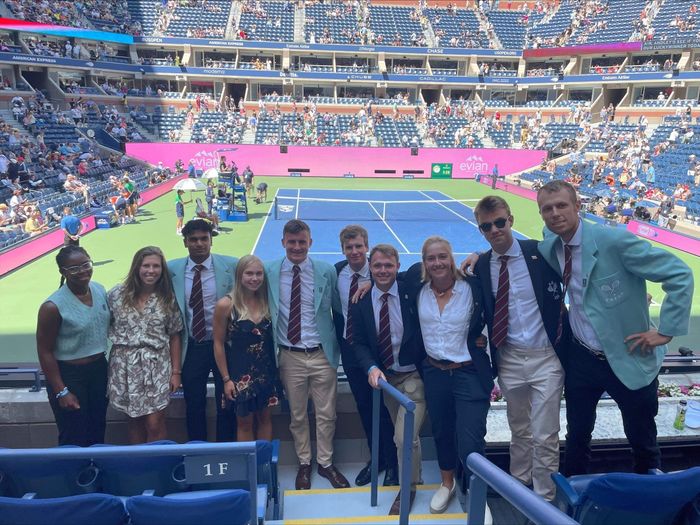Esah Hayat: NatSci and Britain’s No. 1 deaf tennis player
Esay Hayat talks about his journey to becoming Britain’s No. 1, and his experience of Cambridge

In between job interviews, tennis practice and his Natural Sciences degree, Esah Hayat found time to talk. Now in his third year, university work has become the centre of attention, but tennis is his real passion.
All elite sportspeople have a glint in their eye when talking about playing, and Esah is no different. “One day,” Esah tells me, recounting his tennis origin story, “while watching my older brother play, a flick switched in my head, and nobody could keep me off the court.” That was aged eleven. Eight years earlier, aged three, Esah underwent cochlear implant surgery. “Fast forward [to now] and here I am, still trying to play every day.”
Cochlear implant surgery is an operation offered to patients who are profoundly deaf in both ears. The surgery has risks; a common complication is facial nerve paralysis, an inability to move certain muscles in the face.
Although Esah will never have full hearing, his surgery was a success. Without it, Esah wouldn’t be able to hear well enough to have a speech-based conversation.
Today Hayat is the five-time British deaf tennis champion, and the poster boy for the sport in Great Britain. Last month he was part of the Cambridge team that won the Prentice Cup by beating Harvard/Yale in the US. Last summer Hayat worked for the NHS, researching the prevention of facial nerve paralysis as an outcome of cochlear implant surgery.

Esah is 20, and he has been playing tennis for nearly a decade. His commitment has paid off. In 2015, Esah won the Boys World Deaf Tennis Championships, representing Great Britain.
Last month, he won his fifth Deaf Nationals singles title, beating the second seed convincingly, 6–2 6–0. Despite ranking number one in Britain, Esah doesn’t feel the pressure. “I've never really seen my ranking as something to be nervous about,” Esah tells me, “It's definitely a source of motivation for me to stay sharp on the court, but I think there's always more to achieve, so I try to always look ahead.”
He’s an inspiration, too. “Being one of the top deaf players gives me the platform to help younger players improve and be of benefit to something beyond myself.” It’s true — if one looks up information about deaf tennis on the Lawn Tennis Association website, there is a photo of Esah reaching for a volley.
Playing tennis while deaf can have numerous difficulties. Some are obvious, like hearing the umpire when the ball is called out, or when an opponent's serve is a let. Others are more subtle — not hearing when an opponent strikes the ball, for example. This can slow reaction times down by crucial fractions of a second, due to a total reliance on sight. But these difficulties don’t stop Esah competing with the Cambridge Blues. He was a vital member of the team in their dramatic win over Harvard/Yale last month, a trip that “created a lifetime of memories for us.” No doubt Esah will be equally important in the Varsity match at the end of Easter.

Esah nearly did not come to Cambridge. He had another offer to study in the US on a tennis scholarship, but turned it down. He doesn’t regret his decision. “My experience at Cambridge has been excellent,” he says, “I think the university and the people here are well-informed and adaptable to people in my position.” Esah considers himself lucky, having encountered few issues during his tennis career. The issues he has encountered, he has learnt from: “My advice to others with any form of impairment would be to have the confidence to speak up about anything you need, whether it be to friends, professors or people in the sporting scene here.” The onus isn’t just on the athletes: “It wouldn’t ever hurt for the Cambridge sporting community to be proactive in letting friends and colleagues know that too.”
18 years after Esah’s cochlear implant, he returned to the NHS, this time researching the surgery. His research was on the prevention of facial nerve paralysis, which affects 3% of patients that have the surgery. When Esah underwent the procedure, he says: “there wasn’t much information given to my parents about the likelihood of me experiencing [facial nerve paralysis].” Esah has now directly contributed to improving medical care for deaf patients, and hopefully will continue to do so. At the same time, he remains a role model for young tennis players around the world, and anyone involved in sport.
 Comment / Plastic pubs: the problem with Cambridge alehouses 5 January 2026
Comment / Plastic pubs: the problem with Cambridge alehouses 5 January 2026 News / Cambridge businesses concerned infrastructure delays will hurt growth5 January 2026
News / Cambridge businesses concerned infrastructure delays will hurt growth5 January 2026 News / New movement ‘Cambridge is Chopped’ launched to fight against hate crime7 January 2026
News / New movement ‘Cambridge is Chopped’ launched to fight against hate crime7 January 2026 News / Uni-linked firms rank among Cambridgeshire’s largest7 January 2026
News / Uni-linked firms rank among Cambridgeshire’s largest7 January 2026 News / AstraZeneca sues for £32 million over faulty construction at Cambridge Campus31 December 2025
News / AstraZeneca sues for £32 million over faulty construction at Cambridge Campus31 December 2025











